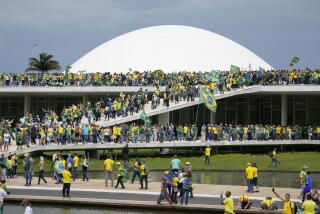Cuba Tries Dissidents in Bid to Stifle Opposition
- Share via
HAVANA — The first wave of dissidents rounded up in a nationwide crackdown went on trial Thursday as Fidel Castro’s government moved to wipe out growing opposition. Prosecutors sought life sentences for 12 of the 80 defendants.
International media and foreign diplomats were excluded from the trials, the final phase of Cuba’s harshest campaign against internal dissent in years.
“This is a judicial Tiananmen,” said opposition member Manuel Cuesta Morua, referring to the 1989 Chinese military assault on pro-democracy student protesters in Tiananmen Square.
The recommended sentences of 15 years to life were aimed at “putting the brakes on the opposition and warning the United States about Cuban sovereignty,” Cuesta Morua said outside one hearing Thursday.
About a dozen trials began in Havana and an undisclosed number started elsewhere in Cuba, ranging from the westernmost province of Pinar del Rio to Santiago in the east. The government refused to say how many cases were underway but indicated that all 80 trials would be concluded within days.
Sentences here usually are announced in writing within two weeks after the proceedings.
“This is not a trial,” said Maria de los Angeles Menendez, who also showed up to support the defendants. “They are going to put on a show. The sentences are already decided.”
The dissidents, rounded up beginning March 18, are accused of working with U.S. diplomats on the Caribbean island to subvert Castro’s government and of being mercenaries in the pay of Washington.
Although Cuban authorities publicly announced the arrests and labeled many of the defendants traitors, they have not commented on the trials or disclosed specific charges. But court documents provided by relatives showed that many dissidents are being tried on accusations of state security crimes under laws that prohibit Cubans from working with foreign powers to undermine the socialist system.
The crackdown ended several years of relative government tolerance for the opposition. It began when Cuban officials criticized the head of the American mission in Havana, James Cason, for his active support of the island’s opposition.
More to Read
Sign up for Essential California
The most important California stories and recommendations in your inbox every morning.
You may occasionally receive promotional content from the Los Angeles Times.













